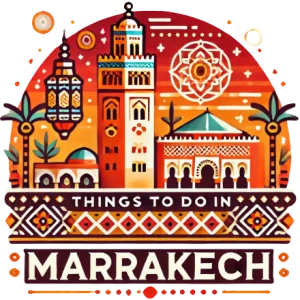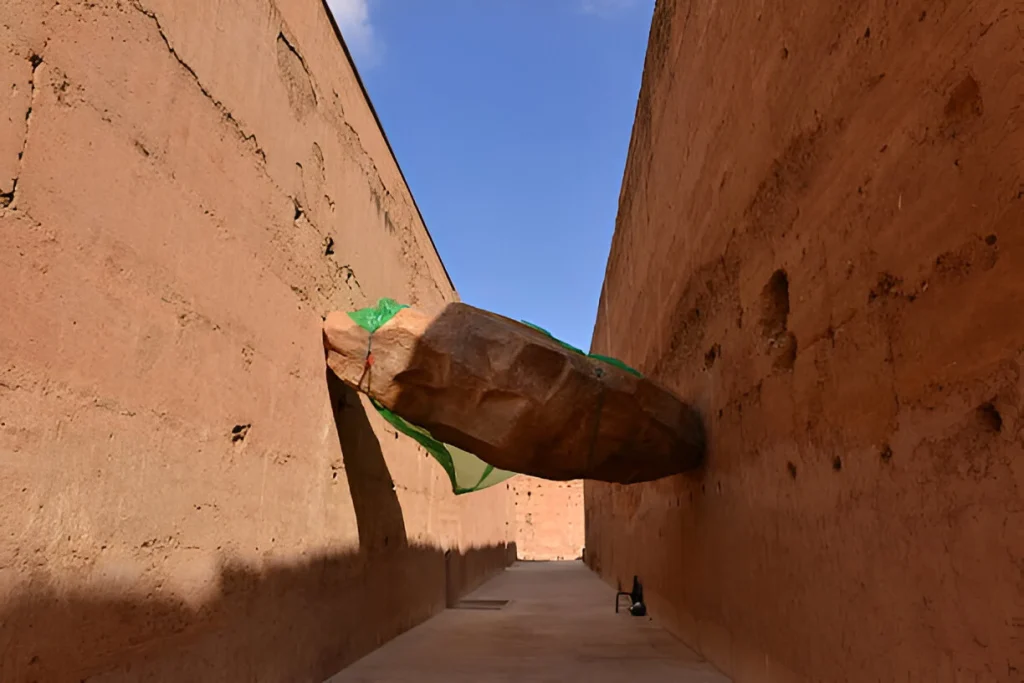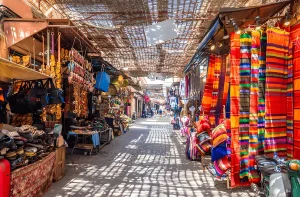If you’re planning a trip and asking yourself, “Is Morocco safe to visit?” — you’re not alone. It’s one of the most searched travel questions about the country. As someone who’s lived here and worked in tourism for years, I know the answer isn’t black and white. It depends on where you’re going, how you’re traveling, and what kind of traveler you are.
Whether you’re heading to the winding souks of Marrakech, the mountains of the Atlas, or the sands of the Sahara, safety is something every traveler should understand before boarding a plane. So let’s get into it — without sugar-coating anything — and help you feel confident and informed about your trip to Morocco in 2025.
Table of Contents
How Safe Is Morocco in 2025?
Let’s start with the latest facts. According to the 2024 Global Peace Index, Morocco ranks 74 out of 163 countries — higher than many popular destinations including Brazil, Turkey, and South Africa. It’s considered one of the safest countries in North Africa.
The UK Foreign Office, US State Department, and Canadian Travel Advisory all classify Morocco as a country where standard precautions are sufficient. These are the same advisories given to places like France and Spain.
In day-to-day life, violent crime is extremely rare. Petty crime like pickpocketing can happen — just like in Barcelona, Rome, or New York — especially in crowded places like medinas, markets, and train stations.
So, is Morocco safe to visit? Yes — with basic awareness and good travel habits, it’s one of the most accessible and enriching places you can explore today.
Is Marrakech Safe for Tourists?
Since many travelers base themselves in Marrakech, this deserves special attention.
Marrakech is safe, but busy. The city is alive with energy — mopeds, vendors, snake charmers, and tourists weaving through the medina. It can feel chaotic, but underneath the buzz is a well-developed tourism ecosystem. There’s a reason why over 3 million visitors came to Marrakech in 2023 alone.
Here’s What to Know:
- Scams are more common than theft — expect people offering unsolicited help or guides with inflated prices.
- The medina can feel overwhelming at first. Stick to well-lit streets, use Google Maps, and don’t hesitate to ask your riad staff for walking directions or trusted guides.
- Solo female travelers are safe, but street harassment does exist. Dressing modestly and confident body language help reduce unwanted attention.
- Taxis should use meters — if not, agree on a price before the ride. Or use ride-hailing apps like Heetch or Roby.
I’ve guided dozens of visitors through Marrakech, and 99% end their trip saying they felt safer than they expected.
Common Safety Concerns (and the Reality)
1. Terrorism
Let’s be completely honest and clear: terrorism is not an issue in Morocco. Unlike other countries in the region that have faced instability or violent extremism, Morocco has managed to maintain a strong internal security structure that keeps threats extremely low. This isn’t just talk — it’s backed by solid action.
Over the past two decades, Morocco has invested heavily in counter-terrorism strategy, prevention, and intelligence. The country has some of the best anti-terrorism operations in North Africa, regularly dismantling potential threats before they ever become a danger to the public. The government works closely with international partners, including European and American intelligence agencies, and is considered a reliable ally in global security matters.
In fact, Morocco is often used as a case study for successful counter-terrorism in the region. Security forces are proactive, highly trained, and constantly monitoring for signs of extremism. If you’re wondering is Morocco safe to visit in terms of national security, it’s worth knowing that public areas like airports, major squares, train stations, and tourist sites are routinely patrolled — not just by uniformed police, but also by plainclothes officers and undercover agents whose job is to quietly observe and act if anything seems off.
If you’re wondering whether it’s safe to walk around busy places like Jemaa el-Fnaa in Marrakech, the answer is yes. You’ll feel the police presence, but it’s discreet and non-intrusive. Their role is to keep things safe, and they’re good at it.
There hasn’t been any widespread unrest or attacks targeting tourists in recent years. Morocco’s approach to safety is serious and consistent — not reactive. So if you’re asking yourself, “Is Morocco safe to visit when it comes to terrorism?” — the answer is a confident yes. It’s actually one of the safest countries in the region in this regard.
2. Political Stability
One of the reasons Morocco is such a reliable destination for travelers is because it’s politically stable. The country has a long-standing constitutional monarchy that plays a central role in maintaining order, guiding reforms, and encouraging investment — especially in tourism. His Majesty King Mohammed VI is seen as a unifying figure, and his leadership has brought decades of consistency to the country’s policies and international relationships.
Unlike some countries in the region that have dealt with political turmoil, coups, or ongoing civil unrest, Morocco has managed to stay calm and focused on development. This includes huge investments in infrastructure, renewable energy, transportation, and — most importantly for travelers — the tourism sector. Cities like Marrakech, Agadir, Fes, and Tangier have seen continuous improvements in roads, airports, public spaces, and security services over the past 10+ years.
While small-scale protests do happen from time to time, they are usually related to local economic or social issues, and they tend to be peaceful and well-managed. Most demonstrations are short-lived, take place in designated areas, and rarely affect tourists or popular attractions. If you’re asking yourself is Morocco safe to visit during these moments, the answer is yes — these events are generally limited in scope and don’t interfere with travel plans. In fact, if you’re staying in Marrakech, Rabat, or even Casablanca, it’s highly unlikely that you’ll even notice any unrest.
The local population is generally welcoming toward foreigners, and the government sees tourism as a strategic priority. That means tourists are respected and protected, and the overall environment is one where travelers can explore without worrying about getting caught in any kind of political tension.
So if you’re still asking yourself, “Is Morocco safe to visit when it comes to political stability?” — the answer is a reassuring yes. It’s a country that values its visitors, takes its image seriously, and has built a dependable foundation for safe and enjoyable travel.
3. Health and Hygiene
You won’t need any special vaccines to visit Morocco in 2025. Tap water is safe in big cities like Casablanca and Rabat, but in Marrakech and most rural areas, stick to bottled water. Food is generally safe — just avoid raw items from street vendors and eat where it’s busy.
4. Women Traveling Alone
Morocco is not dangerous for solo female travelers, but it’s important to be prepared. Verbal harassment can happen, especially in touristy spots. Most of it is harmless, but annoying. It’s okay to ignore comments and walk away. Women who stay in reputable riads, join group tours, and dress modestly often report feeling comfortable and safe.
Personal Safety Tips for Morocco
Here’s what I always tell my guests, friends, and readers who ask: “Is Morocco safe to visit?” These are my go-to tips — based on lived experience.
- Keep your phone in a crossbody or zippered bag — avoid back pockets or open totes.
- Be polite but firm — say “No, shukran” and keep walking.
- Don’t walk alone in quiet streets at night, especially in medinas.
- Use registered taxis or ride-hailing apps late at night.
- Learn a few words of Darija or French to earn respect.
- Use ATMs inside banks or malls, not in the open streets.
Is Morocco Safe for Families?
Absolutely. Morocco is one of the most family-friendly countries I know. If you’re a parent wondering is Morocco safe to visit with kids, the answer is yes. Moroccans love children, and it’s common to see locals go out of their way to help families.
Hotels, riads, and even desert camps offer extra beds, family rooms, and kid-friendly meals.
Just keep your usual precautions in mind:
- Keep an eye on kids in busy areas
- Watch out for rooftops or stairs in riads
- Bring snacks, sunscreen, and bottled water on outings
How About the Sahara and Mountains?
Desert tours are popular and safe when booked through reputable operators. If you’re heading to Merzouga or Zagora, make sure the tour includes:
- A licensed driver and guide
- 4×4 vehicles for remote areas
- Support in case of weather changes
If you’re trekking in the Atlas Mountains, always use certified guides. Don’t hike alone, and check conditions before setting out.
Is It Safe to Drive in Morocco?
Yes, but it’s not for everyone. Driving in cities is hectic, but rural Morocco is a dream. Roads are good, and highways are modern.
Tips for Safe Driving:
- Drive during the day
- Watch for animals and sudden speed bumps
- Wear seatbelts — police enforce it
LGBTQ+ Travelers: What to Expect
Same-sex acts are criminalized, but tourists are rarely targeted. Public affection of any kind is uncommon. Discretion is advised. International hotels are more relaxed and usually tolerant.
Natural Hazards & Climate Considerations
Earthquakes are rare but possible — like the one near Marrakech in 2023. The city recovered quickly. In summer, heatwaves can be intense. In winter, snow in the Atlas may block mountain roads.
Police & Emergency Numbers in Morocco
- Police (urban areas): 19
- Police (mobile phones): 112
- Gendarmerie (rural police): 177
- Ambulance: 15
- Fire brigade: 15
Police presence is high in tourist zones. Officers are usually helpful even if their English is limited.
Final Thoughts: Is Morocco Safe to Visit in 2025?
Yes — it’s safe, vibrant, and welcoming. Morocco balances culture and modern travel well. Like anywhere, it has quirks. But if you’re aware and respectful, your trip will likely go smoothly.
From Marrakech’s buzzing souks to the calm of the desert, Morocco offers a travel experience that sticks with you — and often calls you back.
What’s Next?
Planning a visit to Marrakech? Check out my local guide to the best day trips from Marrakech — from waterfalls to kasbahs, I’ve got you covered.
Got questions about safety or anything else before your trip? Drop them in the comments or message me directly — I’m happy to help.
Is Morocco safe to visit for solo travelers?
Yes, Morocco is generally safe for solo travelers — including women. The key is to stay in reputable accommodations, avoid isolated areas at night, and dress modestly, especially in traditional cities. Many solo travelers find the country welcoming and easy to navigate with some basic preparation.
Is Morocco safe to visit right now in 2025?
As of 2025, Morocco remains one of the safest travel destinations in North Africa. There are no active threats or major travel warnings, and tourist infrastructure is strong. The government continues to prioritize safety in all major cities and tourist areas.
Are there any areas in Morocco that should be avoided?
Most of Morocco is safe, but like any country, some areas are less tourist-friendly. Avoid venturing into poorly lit alleys late at night, especially in unfamiliar medinas. Remote border zones near Algeria are also best skipped unless you’re with a local guide or on an organized tour.
Is Morocco safe to visit for LGBTQ+ travelers?
Morocco is socially conservative, and same-sex relationships are not legally recognized. However, LGBTQ+ travelers are generally not targeted. As long as public displays of affection are avoided (for any couple), most travelers report no issues. Choosing discreet, private accommodations is a smart move.
Is it safe to eat street food in Morocco?
In most cases, yes — especially if it’s fresh and the vendor is busy with locals. That’s a good sign of quality and hygiene. Avoid raw or undercooked food, and stick to bottled water, especially outside of big cities.





